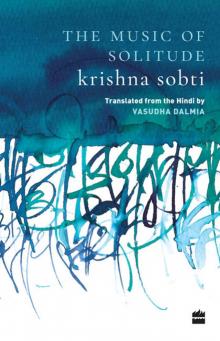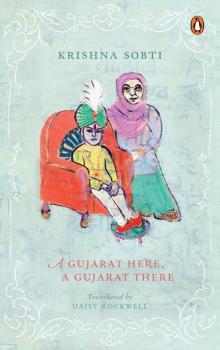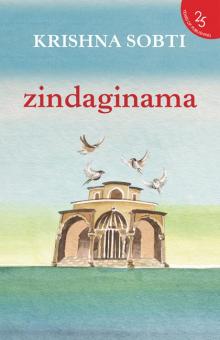- Home
- Krishna Sobti
Zindaginama Page 4
Zindaginama Read online
Page 4
Nawab touched her feet. ‘Chachi, only with your advice and blessings will my boat find its moorings.’
Husaina Nain of the barber caste arrived at daybreak with Reshma of Khojis’ spinning wheel.
Shahni said, ‘Husaina, call for Babo Mirasan of the entertainers’ clan. She will liven things and cheer up the girls.’
The spinning wheels and wicker stools were set out in rows in the long room below, next to rush baskets bursting with cotton.
The hall was full of newly-married girls with bejewelled noses and ears, and girls, nubile and giggling, ripe to dive into full-blooded youth.
Chachi Mehri didn’t allow Mabibi a moment’s rest. ‘Bring the changair of popcorn; the one with jaggery pinnis. Have you forgotten the murundas of Seelam? Where is the sheerni platter?’
The girls laughed, teasing Mabibi, ‘Mabibi, bring your beautiful charming face on a platter too.’
‘Hai ri, you came by yourself? You should’ve brought your dhol also. It would’ve been a contest to remember.’
‘You chatterboxes, khairon se, you’ve sat down to it at daybreak. Laugh and play, but don’t forget to spin.’
When Shahni sat down on her peedhi to spin, Reshma chirped, ‘Shahni spins raw silk – not cotton.’
‘And why not? She who wears silk should spin silk.’
‘Why, Reshma, have you also caught the habit from young Rabeyan of the Arais? Stringing verses!’ exclaimed Noori.
Shahni looked around. ‘Kyon ri, why have Rabeyan and Fateh not arrived? Go Niyamat, call Nawab. He will call the sisters. Tell them not to forget their spinning wheels.’
Niyamat had just stood up when the sisters arrived.
‘Long life to you! You’ve brought your charkhas, na?’
‘Ji, Shahni.
‘Without cotton, what to spin?
Without a charkha, what’s Trinjan?’
Chachi Mehri happily took their balaiyyan, motioning with her hands over their heads to divert their ill fortunes upon herself. ‘Main sadke, main vaari, Rabeyan. What couplets you string! Mabibi, put six cottonballs on each wicker platter.’
‘Ari, daughters of your mothers and fathers, start working your cotton. I can hear the staff of Ditta the watchman …’
Ghoon … ghoon … ghoon … ghoon … the handles of spinning wheels started moving in unison and thin threads started to appear out of the spindles.
‘Look, look at Shahni’s thread. Fine as a hair.’
‘Shut up, you girls, look to your work, and spin your own yarn.’
The girls started laughing: ‘Chachi, do we cast the evil eye?’
The wicker baskets started to dance with cotton skeins. The balls of cotton started getting lighter.
Kammo said, ‘Sister Babo, why are you sitting silent? Shahniji, ask Babo to sing something.’
‘“Heer,” Babo, sing “Heer”,’ the girls begged.
Chachi Mehri said, ‘Sing for the girls ri, but sing softly. The rich tones of your voice move the very rafters. Khairon se, the men are sitting upstairs.’
‘Lo, listen, to Chachi’s admonishments!’ Babo grumbled. ‘One doesn’t even cry in a subdued voice in siyappas at funerals, and this, by God’s grace, is Waris Shah’s Heer! Forgive me for saying so, but while the manly Ranjha of Takht Hazara loved Heer of the Sayals, and made her cry, and Waris Shah sang Heer and adorned many a love affair, our own useless men don’t even recognize the music of Heer. Ari, Shahniyo, life itself comes alive upon listening to Heer.’
‘Enough ri enough, no more airs. Start singing.’
‘Lo, listen girls –
‘Seated in her palanquin Heer cries,
“They’re taking me away, Father, taking me!
Keep me home, Father,” she beseeches.
As the bearers hoist the palanquin atop their shoulders, Heer weeps,
“Forgive me Father if I said or did anything to hurt you …
I stayed in your home but a little while!”’
Shahni’s eyes grew tearful. Mabibi wept silently. Roused by the sad words, the girls searched Babo’s face.
‘In God’s care! If He protects, only then love finds fulfilment,’ Chachi said sagely.
Mihindi of the Aroras broke into peals of laughter. ‘Lo, listen to Chachi! How does God come into stories of love and loving?’
‘Chup ri, small mouth, big talk! If God doesn’t protect the lovers, their love does not come to fruition. Those crossing the river Chenab on clay pots find their pots turning soft and dissolving in water.’
Babo raised her voice in song again:
‘First sing praises of the Lord,
He loved, and so the world began
God Himself was the first to love
His beloved was Nabi Rasool Miyan
Pirs and fakirs are instances of love
What of earthly love?
Asked Sajool Miyan
Divine love is above earthly love,
Thus spake himself, Najool Miyan.’
When Babo saw the girls lost in thought, she teased them saying, ‘My maidens, why worry before your time? When it’s time for love, God Himself will see to its fulfilment.’
Holding the half-spun thread in her hand, Harbanso stared unblinkingly at Babo.
‘What are you thinking, precious, khairon se, you haven’t even flowered yet!’
Harbanso hid her face in her hands.
Rasooli laughingly shook her head, jangling her earrings. ‘Babo behan, it’s not good to always joke about this.’
Mabibi, seeing Chachi’s thunderous expression, gestured with her hands. ‘Leave this. Sing something else.’
Babo started a song on suhaag, the song of marriage:
‘My maiden, why do you stand in the shade of the moon,
Ji, I stand beside my sire, he has found me a groom …’
There was nothing in the offing – no engagements, no marriages – yet Babo Mariam had taken up the theme of suhaag.
Shahni got up and brought a bowlful of milk for Babo. ‘Here, refresh your throat. Meanwhile, the girls will sing for us.’
Someone called out, ‘Fatima behan, sing Ghodi by Nabi Rasool, the one that sisters sing when their brother sets off to marry his bride. Goes straight to the heart.’
‘The gardener strung flowers together
To make a sehra for my brother
Nabi Rasool will take full care
In whose grace he rides the mare
Salyat Yah Ali –’
Fatima stopped singing, suddenly overcome. ‘Saheliyon, I promise I’ll sing some other time. When my brother returns from the war, then I’ll sing in a full voice …’
Chachi Mehri took her balaiyyan: ‘All seven protections of God upon your brother, daughter! Our Shauqat will come back with medals on his chest.’
‘And mine too, Chachi,’ Zafar’s younger sister, Akbari called out.
Shahni’s heart brimmed over. She put some jaggery in Akbari’s lap: ‘May the brothers of all sisters live a long life! Sweeten your mouth, my child!’
‘I’ve heard that Zafar has gone to Cheena?’
‘Na, Chachi, his platoon is in Landikotal. He has gone to battle with the imperialists.’
‘May God protect him. He’ll come back with name and fame.’
‘Sing ri, someone sing Sohni-Mahiwal – the love story of the passionate daughter of the high-caste Syeds who fell in love with a dyer – Fateh ri, you sing please!’
A plain brown odhni draped over a black kurta. Face like sculpted marble. One hand resting lightly on the charkha handle, the other cradling her chin, she sang:
‘I call and call out to my soulmate who is Mahiwal, O my mother
My God is Rabb-Rasool, but my belief is Mahiwal, O my mother
The life-universe inside my being, its lord is Mahiwal, O my mother
If Fazal Shah wants, I can sacrifice my life
But every pore of my being will still call out “Mahiwal”, O my mother …’
‘Ari Rabeyan,
you recite something too. You are known to be smart with verse.’
All eyes turned to Fateh’s sister. Such classical good looks in the clan of vegetable-sellers!
Rabeyan stared at Shahni with awestruck eyes, as if Shahni were a statue or something luminous.
‘Lo listen:
‘The soft glow of diyas,
Colourful charkhas bright,
Milk-white maidens
Fair as moonlight
The frost-sting of winter dawn
Shahni spinning in the morn …’
‘In gods’ care, Rabeyan ri, you are gifted! Sing some more, my child!’
‘Shah, owner of the well,
Brings bucketfuls of water
Shahni, queen of his hearth,
Uses as she pleases …’
Listening to her, Shahni was overcome. Taking off the beads around her neck, she handed them to Rabeyan. ‘Le le ri, take it, Shahni gives in pleasure – keep it safe. Wear it when you go to your in-laws’ house.’
The girls around gushed, touching the necklace and examining it.
‘Hai ri, who strung it?’
‘In the centre, it has the sacred stone of Haurd-Ali.’
‘Raabi ri, your prince must be about to arrive on his horse.’
‘Auspicious beginning at the hands of Shahni! This is very good indeed.’
Suddenly, Chachi Mehri glared at them. ‘Ari sweet-as-jaggery girls, these changairs full of sweets are waiting for you. If you don’t spin, what will you eat? If just your tongues work and not your hands, the baskets of yarn will remain empty and your mothers will grumble. They have sent you to spin for Trinjan.’
‘Hey brother
In your fancy clothes
Toss us a coin as you walk apace
Toss away your greed and illusions
And gain the flower of God’s grace …’
‘Enough, Jaatko! Take these fruits and beat it.’
‘What do you mean, beat it? We want coins, takas.’
‘Na children, that’s not on.’
‘We want money!’
‘We want dhelas!’
‘Come on, open your fists!’
The children began to chant: ‘Dhela … paisa … damri …’
Kids always gathered in front of the houses in which a wedding had taken place, where a new bride had just arrived, or one into which a son had been born.
When Shano’s mother saw her daughter among the children, she pulled her by the plait and thumped her back. ‘Do you keep any time or hours? For the past seven days, you’ve been to every house, in every street. Not bothered about food. Or work. Come and help me clay-wash the pasaar.’
The children taunted:
‘Clay-wash the pasaar
Shano surely will
Spread your jholi
Shano’s ma will fill!’
‘Hato, durr hato … get away!’ Shano’s mother shooed them off like they were mongrels.
And the children laughed:
‘Come bhai come,
Lohri surely will
Come to this home
And on that Lohri
Shano’s ma will
Cuddle her child
Ari, may your child live!
Shano’s brother live!’
Shano’s mother’s temper melted and her breasts swelled at the thought of having a son. She pretended to be angry. ‘Arey, shame on you! Think before you speak!’ She handed the kids a fistful of cornpuffs, and grabbed Shano by the arm. ‘Sirmuniya, you’ve also joined this bunch of wild urchins,’ she said, pretending to be annoyed. Then, giving her daughter a gentle nudge, she said, ‘Go, I’ll clay-wash the pasaar myself. Be back before dusk falls.’
Standing in the doorway, she listened to the children’s voices: ‘Ari, may your son live; may the seven protections be on him …’ Then she went to the pasaar, opened the wooden chest and, taking out her rich wedding dress trimmed in golden gota, spread it out on the cot. Hai ri, why didn’t I think of it before? Should’ve put it out in the sun to air. Khair sadke, these eyes are already anticipating the arrival of Shano’s father. Who knows, he just might arrive from Patna Sahib on this auspicious day! She touched the happy spread of her belly below her breasts, then ran a hand over her hair. Thank God, I didn’t massage ghee into my hair. Shano’s father gets really put off by the smell. With the grace of Vaheguru, if my husband arrives today, I won’t have to rush off to wash my hair.
Come evening the village resounded with preparations for Lohri. A mound of dried cowpats was heaped with stacks of wood. First mund wood, then kikar-beri and finally, dried twigs of cottonwood. Platters of offerings started arriving at the community centre. Special sweets arrived from homes that were blessed with happy tidings. Popcorn. Jaggery. Revdis. Trichauli of sesame and rice. Pots of buttermilk, and wicker platters of radishes.
Umda, of the barber caste, brought a wide bowl of henna paste from the house of the Shahs, followed by workers carrying baskets of spiced jaggery and Bengal lentil pinnis.
The community centre resounded with the laughter of women and children.
One bride came wearing a sequinned salwar-suit of red velvet. Another wore blue kabuli daryayi. One came in a pink odhni with intricate bankadi work; one in a green khaddar salwar-suit with golden appliqué gokhrus. One, especially loved by her mother-in-law, wore a cheermewali phulkari with its baboye and kauri shell pattern.
Parvati, the fair daughter-in-law of the dark-skinned Kochhars preened, proud of her beauty.
Mohar Singh’s wife wore a chhuhara embroidery salwar-suit and blushed shyly in her odhni.
When Shahni and her younger sister-in-law Bindradayi arrived, wearing golden baag embroidered phulkaris, they led the gathering in grace and beauty.
Draped in white dupattas, the elderly women sat, stately as ripened crop, surrounded by their families, the very personification of mother earth bequeathing the bounty of the land to her children …
New mothers sitting on cots and peedhis in the courtyard suckled their babies under their odhnis. Brides in short and long veils would now and then adjust the tikka and the singarpatti ornaments that adorned their heads. One adjusted the gathers of her salwar, another, sitting with her sister-in-law, winked naughtily at her friends.
Mohra’s mother brought her daughter-in-law Bachno and made a big show of speaking lovingly to her: ‘Sit my child, laugh and enjoy a while.’
When Bachno lifted her veil a little, the new brides smiled among themselves.
Pyara’s wife was known for her outspoken ways. ‘Bebe, good you made her sit with us. She’ll enjoy herself much more if she is away from you.’
Bebe pretended not to hear her and turned to the women of her own age.
When Deve Khullar’s veiled daughter-in-law entered in a pink salwar-suit and laden with gold ornaments, she touched the feet of all the elderly women by turn.
Chachi Mehri kissed her forehead: ‘Hain ri, such fair skin, the very touch would soil it.’
Shahni took some dried coconut and dates and, tracing a circle with a coin, did a sirwarna around the girl’s head, and put the auspicious offering in her odhni. She called out to Khullar’s bebe, ‘Bebe, what is your daughter-in-law if not the rising moon herself?’
‘Not as beautiful as your feet even, daughter!’
Shahni, taking out coins from a silk pouch, did sirwarna of the rest of the children. Her sister-in-law took Mayawanti’s son in her lap and asked, ‘Kyon ri, who does the child take after?’
‘His grandmother, Chhoti Shahni, his grandmother. That’s why my mother-in-law is so pleased!’
Then Vadde Lala and Bebe Nikki arrived, and everybody, young and old, went to touch their feet in pairipauna and seek their blessings in aashirwaad. To the villagers these two revered elders symbolized Swayambhu and Satroopa, the Self Manifesting One and Truth Incarnate.
Also in the crowd were Badhawa Singh and Buddh Singh of Kabul; Ganda Singh, Gurditt Singh, Taya Tufail Singh; Shahji’s cousin, Tarey S
hah, handsome as an Arabian steed with Shahji’s sharp features and the skin of the Mughal Tartars! And of course, Shahji’s younger brother, Kashi Shah, who had a wide forehead and a face scarred by an old attack of smallpox. Kriparam’s moustache sat like two high-tailed birds on his face.
The whole village gathered around the wooden takht on which Vadde Lala sat.
‘Lalaji, why didn’t your sons Bhagmull, Rannmull, Bikrammull and Labbamull come from the canals?’
Bebe Nikki, superstitious dread in her heart, immediately interrupted, ‘Puttara, will you call out the names of all my sons? With the grace of God, the eldest, Channmull, is present. Let the younger ones tend to their lands!’
Kriparam bent and touched Nikki Bebe’s knees. ‘Bebe, don’t mind what I said. The whole village is yours, then why should the evil eye touch your Bhagmull and Bikrammull?’
Bebe stroked his back. ‘Truly said, Kriparam, truly said. You are near me, and they are not. It’s said, far from sight, very far indeed!’
Kriparam hugged Bebe. ‘Bebe, neither are they far, nor you. The whole village is gathered before you, but your heart beats with them! How can they be far?’
Impatient children stared at the platters piled high with food and tugged at their mothers’ dupattas, impatient for something to munch.
Shahji gestured to the priest to begin. Carefully balancing his priestly turban, Pandaji sat down and tied the sacred red thread to a pot of buttermilk. He put some puffed corn and wheat on a platter, added sesame and jaggery, and said in a resonant voice, ‘Mothers and sisters, may the fortune-bringing festival of Lohri be celebrated always and forever!’
Handing the trichauli platter to Bebe Nikki, he helped her light the pile of offerings.
‘Congratulations, badhaiyyaan! Lo, Pandaji, first the bhari of our precious newborns.
‘Lo ji, this from the Naunihal Singh’s!’
‘This from the Chirhas’ maternal grandson!’
‘This from the Khullars’ paternal grandson!’
‘This from the son of Surjan Dan!’
Nikki Bebe pushed Veeranwali, the mother of seven sons, forward. ‘Go, daughter, circle the fire-god in a parikrama and pour this buttermilk as you walk. May this day bless every era with its auspicious deeds. May all men be content. May brides come to every home. May all mothers have seven sons.’

 The Music of Solitude
The Music of Solitude A Gujarat Here, a Gujarat There
A Gujarat Here, a Gujarat There Zindaginama
Zindaginama